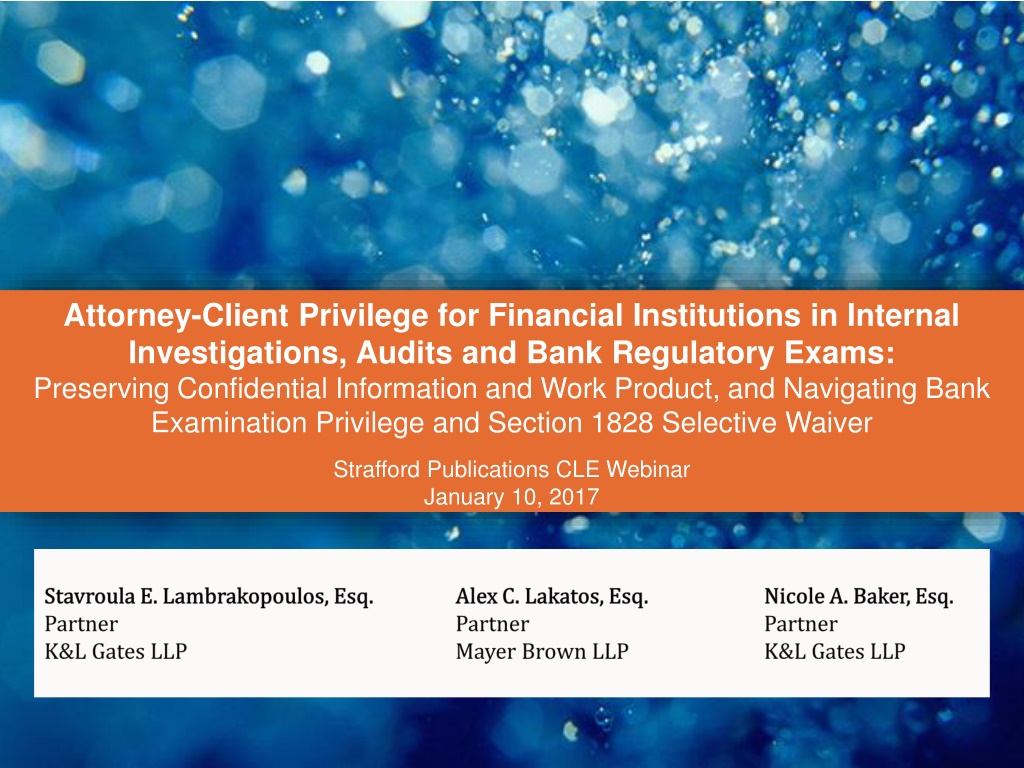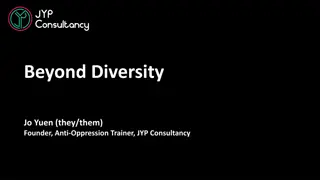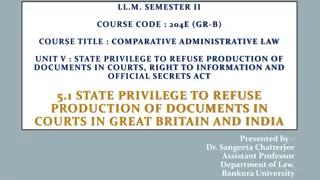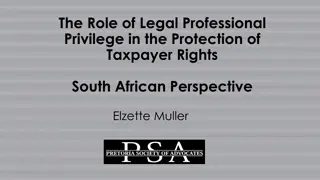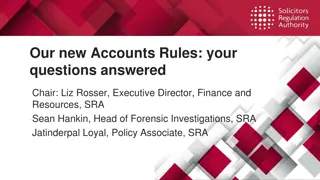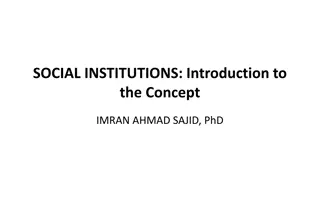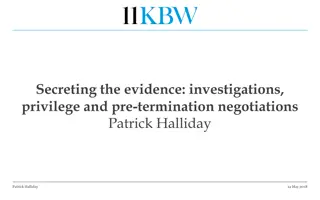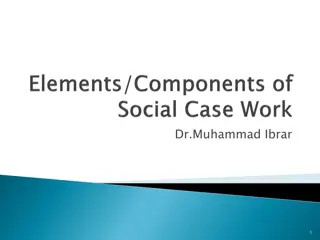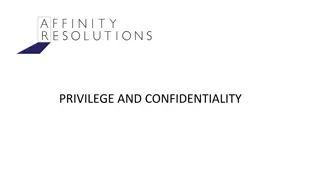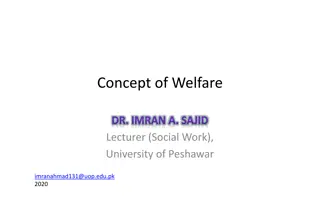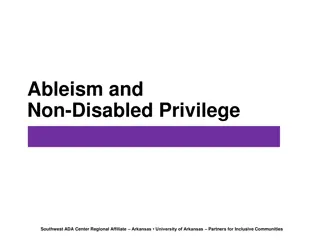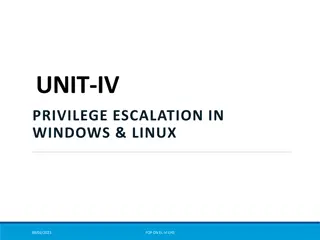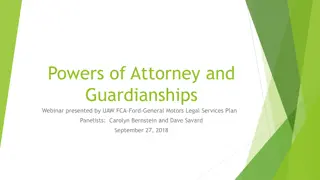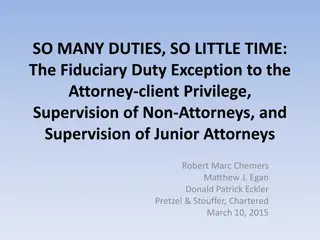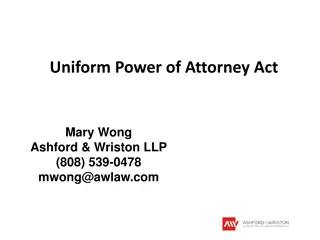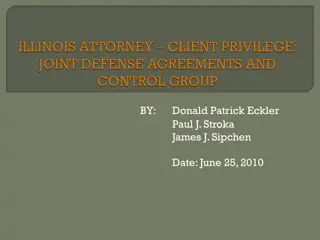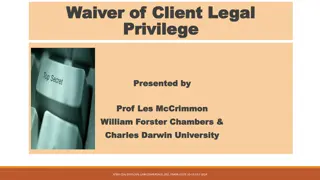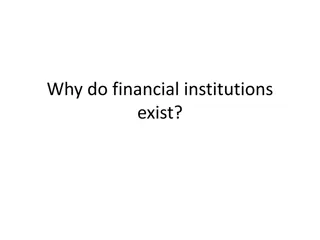Understanding Attorney-Client Privilege for Financial Institutions
Explore the intricacies of attorney-client privilege, bank examination privilege, and work product doctrine in the context of internal investigations and audits within financial institutions. Learn how these protections safeguard confidential information, promote open communication, and guide interactions with regulators to ensure effective supervision of banks.
- Attorney-client privilege
- Financial institutions
- Bank examination privilege
- Work product doctrine
- Internal investigations
Download Presentation

Please find below an Image/Link to download the presentation.
The content on the website is provided AS IS for your information and personal use only. It may not be sold, licensed, or shared on other websites without obtaining consent from the author. Download presentation by click this link. If you encounter any issues during the download, it is possible that the publisher has removed the file from their server.
E N D
Presentation Transcript
Attorney-Client Privilege for Financial Institutions in Internal Investigations, Audits and Bank Regulatory Exams: Preserving Confidential Information and Work Product, and Navigating Bank Examination Privilege and Section 1828 Selective Waiver Strafford Publications CLE Webinar January 10, 2017
Agenda Introduction Protections Commonly Asserted by Financial Institutions Bank Examination Privilege: Purpose, Scope, and Regulator Positions Attorney-Client Privilege: Application and Waiver Internal Investigations: Protecting Communications, Upjohn Warnings, and Reporting to the Government and the Board Practice Tips
Privileges Commonly Asserted by Financial Institutions Bank Examination Privilege o Protects confidential supervisory information and related communications between financial institutions and prudential regulators (OCC, CFPB, FRB, FDIC, state banking regulators) o Intended to preserve absolute candor between banks and their regulators that is essential to the effective supervision of banks Attorney-Client Privilege o Applies to confidential communications, oral or written, between an attorney and her client that relate to the provision or receipt of legal advice and arise from the attorney-client relationship o Intended to promote full and frank communications between an attorney and her clients Work Product Doctrine o Applies to documents created by or at the direction of counsel in anticipation of potential litigation o Intended to protect from discovery attorneys mental impressions, opinions, or legal theories concerning specific litigation
Privileges Commonly Asserted by Financial Institutions, contd Suspicious Activity Report ( SAR ) Privilege o Protects content of Suspicious Activity Report ( SAR ) filed with the FinCEN and the Financial Institution s regulator o Created by statute and regulation, and enforced by judiciary. o Intended to achieve several objectives, including encouraging financial institutions to communicate openly with law enforcement to facilitate law enforcement s access to accurate and complete information, to keep confidential bank methods for identifying and preventing wrongdoing, to prevent tipping of wrongdoers, and to protect privacy of bank customers.
Contexts in Which a Financial Institution May Have to Consider Privilege Issues Examination by a Prudential Regulator o In a routine exam by the FRB, you are asked to produce any compliance reports received by management. Last month, you hired a law firm to conduct a compliance review of the bank s mortgage servicing function. What should you consider when evaluating whether to claim privilege over the law firm s written report in connection with the examination request? Enforcement Action by Government Agencies o You have received a CID from the CFPB requesting documents that include communications with the FRB in relation to a routine exam. What steps should you take to ensure full response to the CID without waiving the FRB s bank examination privilege? Internal Investigation o In response to a whistleblower complaint, you have initiated an internal investigation of a line of business. How do you approach employee witnesses for interviews and information? Private Litigation o The plaintiffs in an ongoing litigation matter request discovery of documents submitted to the CFPB during its investigation of a potential enforcement action. Do you have solid grounds on which to object to this request?
Contexts in Which a Financial Institution May Have to Consider Privilege Issues Third Party Subpoena o You have a report from your lawyer, provided to you for legal advice, describing the conclusions and recommendations arising from an internal investigation concerning potential insider involvement in a securities fraud. At the request of your regulator, the OCC, you have shared it with the OCC. You receive a third party subpoena from plaintiffs who are bringing a securities fraud action, seeking a copy of the internal investigation report. Are you required to produce it? Have you waived privilege? Civil discovery o You are being sued for negligently failing to detect and prevent wrongdoing by a customer who maintained an account at your institution into which the customer received illegal bribes. In fact, your systems flagged this activity and your BSA/AML department filed a SAR. Can you disclose the SAR in your own defense, to show that your institution was not negligent?
Bank Examination Privilege: Purpose Why is this privilege recognized? How do agencies benefit from it? How do financial institutions benefit from it? Bank safety and soundness supervision is an iterative process of comment by the regulators and response by the bank. The success of the supervision therefore depends vitally upon the quality of communications between the regulated banking firm and the bank regulatory agency . . . . Because bank supervision is relatively informal and more or less continuous, so too must be the flow of communication between the bank and the regulatory agency. Bank management must be open and forthcoming in response to the inquiries of bank examiners, and the examiners must in turn be frank in expressing their concerns about the bank. These conditions simply could not be met as well if communications between the bank and its regulators were not privileged. In re Subpoena Served Upon the Comptroller of the Currency, 967 F.2d 630, 633 (D.C. Cir. 1992) (emphasis added). [The privilege] arises out of the practical need for openness and honesty between bank examiners and the banks they regulate, and is intended to protect the integrity of the regulatory process by privileging such communications. Wultz v. Bank of China Ltd., 61 F. Supp. 3d 272 (S.D.N.Y. 2013) (internal quotations omitted).
Bank Examination Privilege: Application/Operation How is this privilege enforced? o The privilege belongs to the regulator. And the documents subject to the privilege belong to the regulator, even if they are in the physical possession of the bank. Thus, the regulator must be given the opportunity to assert and defend the privilege. o Banks should contact the regulator that owns the privilege in the event that protected documents are requested in private litigation. o Courts have allowed regulators to intervene to assert the bank examination privilege in response to a discovery request. o See Local 295/Local 851 IBT Employer Grp. Pension Trust, 2012 WL 346658 (S.D. Ohio Feb. 2, 2012) ( Because the burden of establishing the bank examination privilege falls on the Federal Reserve, it holds a substantial legal interest in determining before potentially confidential documents are produced whether it must advance the privilege. ).
Bank Examination Privilege: Application/Operation To whom does the privilege apply? o The following prudential regulators may assert the bank examination privilege: 1. Office of the Comptroller of the Currency ( OCC ) 2. Board of Governors of the Federal Reserve System ( FRB ) 3. Federal Deposit Insurance Corporation ( FDIC ) 4. Consumer Financial Protection Bureau ( CFPB ) 5. State banking authorities o Foreign regulators may also have rights under this privilege.
Bank Examination Privilege: Scope What documents does the privilege cover? o The privilege covers confidential supervisory information, which, in general, includes documents or information reflecting the opinions, deliberations, or recommendations of the bank supervisory agencies (e.g., documents authored by prudential regulators and (potentially) documents/communications concerning or referring to materials authored by or sent to prudential regulators). What documents are not covered? o Purely factual material falls outside of the privilege. In other words, the document must reflect opinions and the deliberative process of the bank supervisory agency. o For example, numerous courts have concluded that the OCC s bank examination reports are at least partly factual and therefore fall outside the scope of the bank examination privilege. Wultz, 61 F. Supp. 3d at 287. o Determining which documents are covered can be complicated. Court acknowledge that making the determination is a fact intensive inquiry. In some cases, facts and opinions may be inextricably intertwined. Further, regulators may take a broader view than the courts.
Bank Examination Privilege: Scope Importantly, the privilege is qualified, not absolute. o A court may override the privilege if the requesting party demonstrates good cause; that is, a public interest in disclosure that outweighs the agency s interest in confidentiality. o The factors a court may consider in this analysis include: The relevance of the evidence sought to be protected The availability of other evidence The seriousness of the litigation and the issues involved The role of the government in the litigation The possibility of future timidity by government employees (i.e., chilling effect) o E.g., Wultz: The court held that the relevance of the non-factual portions of the OCC s Communications, the lack of adequate substitutes, and in particular the seriousness of the litigation [related to acts of international terrorism under the Antiterrorism Act] and the role of the government in passing the ATA, outweigh the risk of a chilling effect.
Bank Examination Privilege: Regulator Positions, Applicable Statutes/Regulations, and Examples Each bank supervisory agency has promulgated its own regulations to define confidential supervisory information (CSI) and the parameters of its disclosure. But, a bank should not rely exclusively on these regulations when determining whether to withhold documents in private litigation. See In re Bankers Trust Co., 61 F.3d 465 (6th Cir. 1995) Plaintiff issued a petition for writ of mandamus demanding that Defendant produce all documents submitted to or received from the Federal Reserve, including those relating to examination and inspection of the bank. The district court granted the order. On appeal, Defendant argued that if it complied with the district court s writ, it would violate the FRB s regulations prohibiting disclosure of CSI; but if it did not comply, it would be subject to sanctions under the Federal Rules of Civil Procedure. The Sixth Circuit reasoned that Congress did not empower the [FRB] to prescribe regulations that direct a party to deliberately disobey a court order, subpoena, or other judicial mechanism requiring the production of information. To the extent the FRB regulations require this, they cannot be recognized by this court. However, the Sixth Circuit reversed the district court s order on the grounds that it did not separately consider the application of the bank examination privilege.
Bank Examination Privilege: Regulator Positions, Applicable Statutes/Regulations, and Examples Definition of CSI Applicable Regulations o FRB --- 12 C.F.R. 261.2(c)(1) o OCC --- 12 C.F.R. 4.32 o FDIC --- 12 C.F.R. 309.5(g)(8) o CFPB --- 12 C.F.R. 1070.2 As a general matter, the regulations define CSI as: o Examination materials (reports of examination, inspection and visitation, confidential operating and condition reports, and any information derived from, related to, or contained in such reports) o Information gathered in the agency s exercise of its enforcement responsibilities o Documents prepared by the regulator or any other federal or state financial institutions supervisory agency
Bank Examination Privilege: Regulator Positions, Applicable Statutes/Regulations, and Examples Regulator-Specific Examples of CSI FRB o First day letters; reports of examination or inspection and information contained therein, such as supervisory ratings; information related to non-public enforcement actions Excludes documents prepared by a supervised financial institution for its own business purposes that are in its possession. o See Fed. Reserve Bank of N.Y., Circular No. 11002, Improper Disclosure of Confidential Supervisory Information by Financial Institutions (Dec. 5, 1997); Press Release, OCC, Interagency Advisory on the Confidentiality of the Supervisory Rating and Other Nonpublic Supervisory Information (Feb. 28, 2005). OCC o Reports of examination; supervisory correspondence; investigatory files compiled by the OCC or Office of Thrift Supervision in connection with an investigation; internal agency memoranda; testimony from or an interview with an agent of OCC or OTS Excludes statistical material that does not disclose the affairs of any individual, corporation, or other entity.
Bank Examination Privilege: Regulator Positions, Applicable Statutes/Regulations, and Examples FDIC o Records contained in or related to examination; operating or condition reports prepared by, on behalf of, or for the use of the FDIC or any agency responsible for the regulation or supervision of financial institutions CFPB o CFPB reports and supervisory letters; communications between CFPB and supervised entity relating to an exam or other supervisory activities; information created by the CFPB in exercise of its supervisory authority (documents that CFPB examiners have prepared in the course of examination, supervisory information requests and responses, CFPB supervisory actions and related submissions and correspondence) o Excludes documents prepared by a financial institution for its own business purposes and that the CFPB does not possess o Any documents prepared by, or on behalf of, or for the use of the CFPB or any other federal, state, or foreign government agency in the exercise of supervisory authority over a financial institution o See CFPB Compliance Bull. 2015-01, Treatment of Confidential Supervisory Information (Jan. 27, 2015).
Bank Examination Privilege: Regulator Positions, Applicable Statutes/Regulations, and Examples Securing Approval from the Agency As a general matter, a financial institution can disclose CSI to directors, officers, subsidiaries/parents, and third-party services providers, such as lawyers and accountants, without getting approval from the bank supervisory agency. Otherwise, a financial institution seeking disclosure must secure permission from the agency. Notably, o FRB and OCC regulations require approval prior to disclosing to law enforcement agencies and other non-financial institution supervisory agencies. o FDIC regulations require approval prior to disclosing to state banking agencies, federal financial institutions supervisory agencies, and other agencies. o CFPB regulations require approval prior to disclosing to federal or state agencies; approval turns on whether the disclosure is relevant to the exercise of the agency s statutory or regulatory authority.
Bank Examination Privilege: Regulator Positions, Applicable Statutes/Regulations, and Examples Non-Disclosure Agreements with third parties do not justify withholding requested information from prudential regulators. CFPB o A supervised financial institution should not attempt to use an NDA as the basis for failing to provide information sought pursuant to supervisory authority. See CFPB Compliance Bull. 2015-01, Treatment of Confidential Supervisory Information (Jan. 27, 2015). FRB o It is contrary to Federal Reserve regulation and policy for agreements to contain confidentiality provisions that (1) restrict the banking organization from providing information to Federal Reserve supervisory staff; (2) require or permit, without the prior approval of the Federal Reserve, the banking organization to disclose to a counterparty that any information will be or was provided to Federal Reserve supervisory staff; or (3) require or permit, without the prior approval of the Federal Reserve, the banking organization to inform a counterparty of a current or upcoming Federal Reserve examination or any nonpublic Federal Reserve supervisory initiative or action. See Board of Governors of the Fed. Reserve Sys., Confidentiality Provisions in Third Party Agreements, SR 07-19 (Dec. 13, 2007).
Bank Examination Privilege: Distinctions Applicable to Foreign Regulators Materials reflecting supervision by non-US regulars (which would be CSI in the United States) may be subject to different rules abroad. o Important to have experienced local counsel Example: U.K. Financial Conduct Authority ( FCA ) / U.K. Prudential Regulation Authority ( PRA ) o Does not have a concept of CSI privilege o With regard to material provided by the bank, the FCA/PRA have a statutory duty of confidentiality, but this is not a privilege. o As a general matter, the FCA/PRA would decline requests/subpoenas for their internal reports or documents. Whether such documents must then be disclosed would be at the discretion of the court, there is not a hard-and-fast rule. Courts often will back the FCA. o If the FCA s reports/documents are in the hands of the bank, they would not be protected from disclosure.
Bank Examination Privilege: Distinctions Applicable to Foreign Regulators Example: German Financial Supervisory Authority( BaFin ) (Note that ECB is now the relevant prudential regulator for banks in Germany o Under the German Freedom of Information Act law, BaFin must publish information it receives, subject to certain carve outs. Those carve outs would, as a practical matter, keep most of the sensitive information that BaFin receives from a regulated entity out of the public sphere. o Typically, the only way for a third party to obtain information from BaFin, even if there is ongoing litigation, is through the Freedom of Information Act.
Bank Examination Privilege: Distinctions Applicable to Foreign Regulators Example: Swiss Financial Market Supervisory Authority ( FINMA ) o The Swiss Supreme Court in 2015 held that FINMA lacked authority to prevent a Swiss bank from transferring a FINMA order to third parties. o Effective 2016, Swiss law was amended so that Swiss banks must notify FINMA before providing information relating to the bank s supervisory relationship with FINMA to a non-Swiss regulator. FINMA can then refuse permission at its discretion. o If a Swiss bank wants to provide such information in private civil litigation abroad, it must comply with other Swiss laws, e.g., data protection, bank secrecy, but no concept akin to CSI will be applicable.
Attorney-Client Privilege: Application What are the elements of the privilege? o Attorney-client privilege requires: (1) a communication, (2) made between privileged persons, (3) in confidence, and (4) for the purpose of seeking legal advice Can the legal advice element create a risk that certain internal investigations will not be covered by privilege? o Legal advice should be expressly sought and provided. o Was the investigation done to follow a corporate policy, to remediate errors, or to obtain legal advice? Was the investigation done in the ordinary course of business, irrespective of the prospect of litigation? o Does legal advice predominate? o Was an attorney leading the investigation? Was the attorney functioning as an attorney, or giving business advice? Consider role dual hat employees, such as lawyers in compliance functions.
Attorney-Client Privilege: Application When are communications with employees covered by the attorney-client privilege? Are all communications relating to an internal investigation covered? o Communications with employees instructed to assist attorney, on matters within scope of job duties, employees understand purpose of assisting the corporation to obtain legal advice. Communications must only go to persons who need to know. o Most courts hold that former employees are also covered as to attorney discussions concerning facts during their employment. What about communications with outside auditors? o Sharing with outside auditors generally waives privilege.
Attorney-Client Privilege: Application Is attorney-client privilege effective as against regulator? FRB has noted that [a]n argument can be made that [the FRB s] statutory authority to conduct on-site examinations overrides any legal privilege the financial institution may have not to disclose the information [on its premises]. FRB examiners are to immediately to advise the FRB s general counsel if a financial institution asserts privilege over documents that the examiner believes are necessary to carry out an effective examination. OCC permits its examiners to request [certain] privileged materials, but only when the bank s capital and earnings are exposed to material risk, or when the bank s exposure is otherwise considered significant.
Attorney-Client Privilege: Waiver Scope of waiver o Intentional waiver extends to all other the same subject matter if they ought in fairness to be considered together. Fed. R. Evid. 502(a). o Sword and shield. Courts will not allow a party to waive only those communications favorable to its cause. o Determining the scope of a subject matter waiver is a fact intensive inquiry.
Attorney-Client Privilege: Waiver Types of waiver o Voluntary waiver occurs when a client expressly waives the attorney-client privilege by voluntarily disclosing privileged communications to a third party who is not the agent of the lawyer or client. o Selective waiver. Selective waiver refers to a party s assertion that its production of privileged information to a government entity does not waive privilege. At common law, most courts rejected selective waiver. o Inadvertent waiver. Under the Federal Rules of Evidence, an accidental disclosure does not waive privilege of the holder of the privilege took reasonable steps to prevent disclosure, and took prompt steps to rectify the error. o Implied waiver / at issue waiver. Party relies on advice of counsel at part of its argument, e.g., advice of counsel defense. o Partial disclosure, if full disclosure is needed to avoid being misleading o Conveyance to third parties.
Attorney-Client Privilege: Waiver Financial institutions benefit from a statute that provides that sharing privileged documents with regulators does not waive privilege. Under 12 U.S.C. 1828(x): submission by any person of any information to any Federal banking agency, State bank supervisor, or foreign banking authority for any purpose in the course of any supervisory or regulatory process of such agency, supervisor, or authority shall not be construed as waiving, destroying, or otherwise affecting any privilege such person may claim with respect to such information under Federal or State law as to any person or entity other than such agency, supervisor, or authority. Pros / cons o Protects banks, that might have to share privileged materials with their regulators in any event, from third party discovery. Facilitates law enforcement objectives o Encourages regulators to demand privileged materials, fosters culture of waiver
The Garner Doctrine Garner v. Garner v. Wolfinbarger Wolfinbarger, 430 F.2d 1093 (5th Cir. Ala. 1970). o Court recognized that a corporation is not barred from asserting attorney-client privilege merely because those demanding information enjoy the status of stockholders. o But where the corporation is adverse to its stockholders in litigating alleging that it acted inimically to stockholder interests, protection of those interests as well as those of the corporation and of the public require that stockholders be allowed to override privilege based on showing of good cause. o Although Garner arose in shareholder derivative context, it has been applied in other fiduciary contexts, which obligates the fiduciary to safeguard his or her beneficiaries' interest without obscuring his or her reason from the legitimate inquiries of the beneficiaries. o May reach internal investigations report, e.g., re corporate misconduct
The Garner Doctrine Factors Factors (1) the number of shareholders involved and the percentage of stock they (2) the bona fides of the claimant shareholders; (3) the nature of their claim; (4) the necessity of obtaining the information and its availability from other sources; (5) whether the alleged misconduct of the corporation was criminal, illegal but not criminal, or of doubtful legality; (6) whether the communication related to past or to prospective actions; (7) whether the communication was of advice concerning the litigation itself; (8) whether the shareholders are "blindly fishing"; and (9) the risk of revealing trade secrets or other confidential information.
Internal Investigations: Protecting the Privilege Within the Institution Define the Client, Scope, and Goals o Establish the identity of the client for purposes of the investigation Audit Committee or a Special Committee of the Board of Directors General Counsel s Office Internal Audit o Define the goal of the investigation and establish lines of authority and supervision. Be willing to adapt as the investigation progresses. o Identify the roles of senior and junior in-house lawyers (and compliance personnel, as appropriate) in dealing with investigations. o Manage the message upward and downward internally (to management, employees, the board, etc.) and externally (to regulators and the public). Initiate a Litigation Hold o Identify the universe of documents and employees covered by the hold o Coordinate with the IT department to carry out the hold o Provide notices internally and prepare to explain and guide personnel o Update/recirculate the hold periodically
Internal Investigations: Protecting the Privilege Within the Institution Preserving confidentiality through appropriate attention to and exercise of the privilege is crucial. o Failure to maintain privilege may leave the company s most sensitive information exposed to regulators, litigation opponents, and competitors. o There are two layers of materials impacted by the privilege: (1) Historical materials and (2) Materials directly connected to the investigation. o Privilege acts as a double-edged sword. On the one hand, it fosters candor and protects documents. On the other, it prevents an entity from later using documents claimed as privileged, even if the document may be helpful to the entity s position. Think ahead. o Is privilege over the investigation itself necessary? o Will privilege limit the use of affirmative defenses later on? o If you opt for waiver, what documents are swept into the waiver (e.g. What is the relevant subject matter )? o How will a government agency treat the waiver?
Internal Investigations: Interviewing Current and Former Employees Do employees need separate counsel? o Review cooperation provision in employment agreements. o If a criminal matter is pending, consider whether laws of the jurisdiction prevent or limit counsel s ability to conduct the interview. o Consider impact of Yates Memo on company counsel s interactions with individual officers and employees. o Consider the appropriateness of shadow counsel. o Consult the Model Rules of Professional Responsibility: Rule 1.13: Organization as Client Rule 1.6: Confidentiality of Information Rule 4.3: Dealing with Unrepresented Person Rule 4.4: Respect for Rights of Third Persons o Evaluate the need for a joint defense or common interest agreement.
Internal Investigations: Interviewing Current and Former Employees Preparing for Employee Interview o Who should conduct the interview? HR, legal, both? o Should outside counsel be involved and/or present? o What type of information are you seeking? Do you need a statement for the employee s personnel file or regulatory filing (Form U-5)? Are you seeking an affidavit to append to a court pleading? Should the statement be in writing, signed, or attested to by the employee? o If in writing, is there a possibility of disclosure to adverse parties in litigation, a government investigation, or the public? What are the pros and cons of such disclosures? Can the documented statements come back to haunt the organization? o Alternatively, would counsel s confidential notes of the interview suffice?
Internal Investigations: Interviewing Current and Former Employees The Importance of Upjohn Warnings o Notify witnesses that: 1. 2. 3. Counsel is retained by the company (or the Board, Board Committee, etc.); Communications are confidential and subject to privilege; The company, who owns the privilege, may choose to waive the privilege and disclose information provided by the witness; and Counsel does not represent the witness. 4. o Memorialize in writing that you provided this warning and that it was understood. United States v. Nicholas, 606 F. Supp. 1109, 1116 (C.D. Cal. 2009), rev d, United States v. Ruehle, 583 F.3d 600 (9th Cir. 2009) ( As an initial matter, the Court has serious doubts whether any Upjohn warning was given to Mr. Ruehle. Mr. Ruehle did not remember being given any warning, no warning is referenced in Mr. Lefler's notes from the meeting, and no written record of the warning even exists. ). Consider whether Yates Memorandum requires additional warnings o o Underlying facts are not subject to privilege Company may/will provide information to government
Internal Investigations: If/When Cooperation Crosses the Line Into Waiver An internal investigation that is done for the purpose of providing information to the government, and to obtain leniency for the corporation, may not be subject to privilege o Rationale: Purpose is not to provide legal advice to the corporation. Partial disclosure can lead to a broader waiver if the partial waiver alone would be misleading. Courts have held that disclosing brief description of internal investigation, or internal investigation conclusion, does not waive privilege as to the entire internal investigation. o Safer practice to preserve privilege is to rely on evidence alone o Should not be a factor for banking agencies due to 1828(x), but relevant with others, e.g., DOJ and SEC Oral proffers to government can waive underlying privilege. E.g., detailed, witness specific oral proffers can result in waivers of underlying interview notes.
Internal Investigations: Reporting to the Board Where a board committee is the client, that is a classic attorney-client communication situation, which will be protected. However, if counsel reports the results of an investigation to members of management or the board whose conduct may render their interests adverse to those of the company, there is a material risk of waiver. o Consider whether board members be considering information from perspective as potential defendants in their personal capacity o If investigation begins to show that client (e.g., in-house attorney) had more involvement in events that originally understood, may be necessary to transfer supervision of investigation to board committee To help protect privilege o Limit reports to those who need to know o Consider whether oral reports, rather than written, are acceptable o Keep in mind that source materials and facts themselves are not privileged.
Internal Investigations: Reporting to Auditors Reporting to auditors generally results in a subject matter waiver of privilege. Auditors generally appreciate this risk. However, in the wake of high profile accounting fraud cases, auditors are demanding more insight into internal investigations. o Enlist counsel and internal audit to assist with communications o Engage in a dialog early on, giving only information necessary for outside auditor to perform their function o Focus on process to give auditors comfort without revealing privileged information o Avoid providing written materials to auditors
Practice Tips: How Should a Financial Institution Navigate These Issues When Documents Are Requested or Subpoenaed? Examination by a Prudential Regulator o Should consider various factors in determining whether to resist request to waive privilege 1. Relationship with regulator, regulator s rationale, and precedent that sharing privileged information will set. 2. Sensitivity of legal advice sought, including risk of regulator s misconstruing advice and of third party exposure. 3. Ability to provide regulator with alternative non-privileged materials that include only the facts, or that include a write-up designed for regulator s review. 4. Overall strategy, e.g., cooperation credit, advice of counsel defense. o May wish to take additional steps to protect materials disclosed 1. Stamp as privileged and subject to 1828(x) 2. Obtain regulators agreement (in writing if possible) regarding sharing the information with third parties (e.g., FOIA), other regulators. 3. Possible agreement re advance notice if information is sought by third parties 4. Provide cover letter setting forth expectations
Practice Tips: How Should a Financial Institution Navigate These Issues When Documents Are Requested or Subpoenaed? Enforcement Action by Government Agencies o Application of Bank Examination Privilege. Though regulations appear to cover documents exchanged in connection with an enforcement action, it remains unclear whether a regulator can claim the bank examination privilege with respect to documents collected while wearing its enforcement hat. Thus, keep in mind that documents produced in response to a CID may not be subject to protection under the bank examination privilege later on. o Selective waiver considerations may equally apply here. o Privilege log. Consider separately identifying documents withheld under the bank examination privilege and identify the regulator that holds the privilege. o Contact the prudential regulator. If another regulator has a claim on documents requested by a CID or similar enforcement request, contact the other regulator before producing covered documents in connection with the enforcement action.
Practice Tips: How Should a Financial Institution Navigate These Issues When Documents Are Requested or Subpoenaed? Internal Investigation o Outside Counsel. If the investigation is complex or sensitive e.g., the independence of the investigator will be considered a factor in assessing the investigation s credibility and if you seek to attach privilege to the entire investigation, consider engaging outside counsel to assist. o Upjohn Warnings. Providing and documenting Upjohn warnings is essential to maintaining confidentiality and controlling the privilege.
Practice Tips: How Should a Financial Institution Navigate These Issues When Documents Are Requested or Subpoenaed? Private Litigation o Federal Rules of Civil Procedure. Notwithstanding the regulator s promulgated rules, the court might find the discovery rules under the FRCP determinative. o Intervention by Regulator. Contact the regulator who holds the bank examination privilege if such documents are requested by plaintiffs. o Waiver of Underlying ACP. Consider that an underlying attorney-client privilege may have been waived if privileged documents were turned over in an examination or enforcement action. Again, a regulator wearing its enforcement hat may not offer the same protections under the bank examination privilege. Contact the regulator, who may potentially intervene and object to the request.
Practice Tips: Considerations Where Foreign Regulators are Involved Non-US jurisdictions take different approaches to documents that banks would consider privileged if the documents were provided by US lawyers. If an investigation will touch on multiple jurisdictions, consider privilege implications in each jurisdiction. o Example: UK FCA/PRA The FCA/PRA are obligated to keep documents provided by banks (e.g., internal investigations reports) confidential, unless the FCA/PRA need to use the documents in the ordinary course of their responsibilities. In that case, the documents could come out in court filing. The UK recognizes a concept of limited waiver (similar to US concept of selective waiver) pursuant to which providing a privileged document to FCA/PRA does not waive privilege as to third parties, and privilege can still be assert in litigation.
Practice Tips: Considerations Where Foreign Regulators are Involved o Example: German / BaFin BaFin can obtain any materials relevant to matter they are examining and proportional to their needs; attorney-client privilege is not a bar to their doing so. Sharing documents with BaFin typically does not create risk of disclosure in civil litigation in Germany. Germany does not have common-law style discovery. Civil litigants could attempt to obtain materials from BaFin through Germany s Freedom of Information Act law, but as discussed above, carve outs typicall protect sensitive information. o Example: Switzerland / FINMA Unlike in Germany, a regulated bank can involve attorney-client privilege to prevent its regulator from obtaining documents. But, the document must be created by outside counsel, and must be for legal advice. Courts have rejected privilege where it appeared that the bank had outsourced its compliance function to a private law firm.
Practice Tips: Considerations Where Foreign Regulators are Involved Cross-border privilege considerations in the United States o Note that 1828(x) in the US applies even to privileged materials shared with non-US bank regulators. o US federal courts will apply a choice-of-law analysis to determine what privilege laws govern a communication. If a communication is made that touches the United States, or that relates to an underlying US issue , the US law may apply. Accordingly, it is important to have experienced counsel who are familiar with cross-border privilege issues.
Practice Tips: Managing Multiple Regulators Can the BEP be raised against one regulator on behalf of another? Or can it be claimed by two regulators, resulting in a conflict? o CFPB takes the position that its CSI includes any documents prepared by, on behalf of, or for the use of the CFPB or any other Federal, State, or foreign government agency in the exercise of supervisory authority over a financial institution, and any information derived from such documents. Con: CFPB may use this provision to collect documents that are protected by another prudential regulator s privilege. (Need to get other regulator involved.) Pro: May potentially use CFPB s broad definition of CSI to protect from discovery any documents provided to a different supervisory regulator. o FDIC and FRB regulations are similar.
Faculty Biographies Stavroula E. Lambrakopoulos is a partner in the Washington, DC office of K&L Gates who concentrates her practice in securities enforcement matters, securities and financial services litigation, internal investigations and broker-dealer regulation. She regularly represents corporate and individual clients in enforcement proceedings before the SEC, the United States Department of Justice, FINRA, and state securities regulators. She represents financial institutions, corporations, and their officers in complex financial services cases and securities class action litigation. She leads cross-border internal investigations on behalf of multinational public and private companies on various issues including whistleblower complaints, accounting and financial issues and anti-corruption matters. Alex Lakatos is partner in the Washington, DC office of Mayer Brown's Litigation and Financial Services Regulatory and Enforcement practices. Alex practices in complex international litigation, particularly on behalf of non-US financial institutions. He also counsels financial institutions on banking and securities regulatory, enforcement, legislative, and strategic issues. He has significant experience in matters where these areas intersect - for example, the litigation of cross-border disputes in US court in tandem with an SEC, OFAC or bank enforcement investigation. His matters often include parallel litigation in non- US forums. He is experienced in contesting issues of particular concern to non-US financial institutions, such as financial privacy, data protection, multi-jurisdictional discovery, choice-of-law conflicts, sanctions compliance and asset forfeiture. Nicole Baker is a partner in the Washington, D.C. office of K&L Gates. Her practice focuses on government enforcement and litigation matters. She regularly represents individuals and entities, including banks, broker-dealers, investment companies and investment advisers, before the SEC, FINRA, the United States Department of Justice, the CFPB, HUD, and other government agencies. She advises clients with respect to private litigation matters in federal and state courts, as well as AAA and FINRA arbitrations. She also conducts internal investigations on behalf of public and privately held companies, financial institutions and non-profit organizations. 45
For more information contact us: Alex C. Lakatos. Esq., Partner Mayer Brown 1999 K Street, N.W. Washington, DC 20006-1101 alakatos@mayerbrown.com O: 202.263.3312 www.mayerbrown.com Stavroula E. Lambrakopoulos, Esq., Partner K&L Gates LLP 1601 K Street, NW Washington, DC 20006-1600 Stavroula.lambrakopoulos@klgates.com O: 202.778.9248 www.klgates.com Nicole A. Baker, Esq., Partner K&L Gates LLP 1601 K Street, NW Washington, DC 20006-1600 Nicole.baker@klgates.com O: 202.778.9018 www.klgates.com 46
